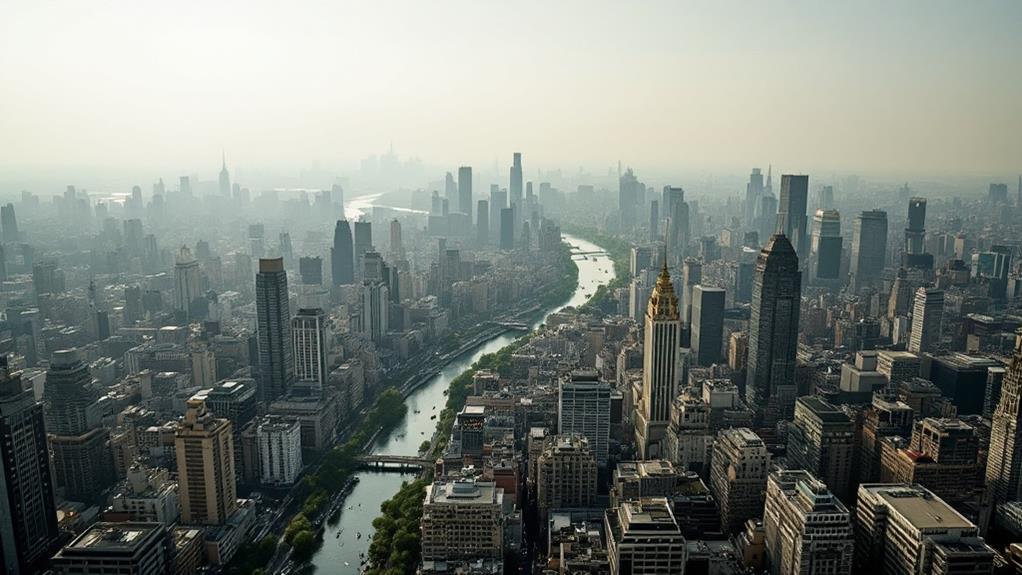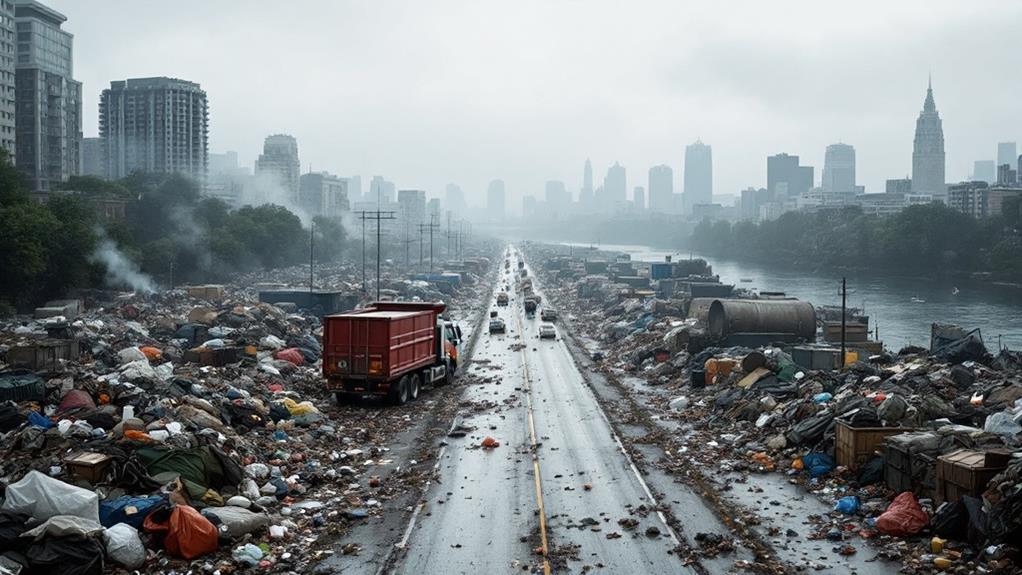What Are the Environmental Challenges Faced by the Largest Urban Areas?

You're tackling serious environmental issues as urban areas expand rapidly. Overpopulation strains infrastructure and resources, and high energy consumption leads to significant greenhouse gas emissions. Air quality suffers, affecting over 90% of city dwellers, especially vulnerable groups like children. Waste management lags, with cities producing 1.3 billion tons of waste annually, causing soil and water contamination. Climate change intensifies urban heat and flooding, affecting informal settlements and infrastructure. Addressing these challenges involves cleaner energy solutions, efficient waste systems, and nature-based urban planning. There are also sustainable urban solutions to investigate for improving resilience and quality of life.
Urban Population Growth Impacts
Urban population growth poses a significant challenge to cities around the world. As urban areas swell, infrastructure and resources face unprecedented strain. You'll notice that this rapid expansion often leads to the proliferation of slums. Over one billion people now live in these informal settlements, making them a vulnerable population susceptible to climate-related disasters. The dense urban population heightens the risk of environmental hazards, with one-third of city dwellers exposed to natural disasters like flooding and heatwaves. Effective urban development must prioritize climate change mitigation and water management to safeguard these communities.
The health impacts of urban population growth are profound. High energy consumption in cities leads to significant greenhouse gas emissions, exacerbating air pollution and deteriorating public health. Vulnerable populations suffer the most, with limited access to healthcare and resources that could alleviate these effects. The widening wealth gap further threatens social stability, pushing impoverished communities deeper into insecurity. As cities continue to grow, it's essential to address these issues head-on. By focusing on sustainable urban development, you can help create resilient urban environments that protect and empower all residents, particularly those most at risk from the adverse effects of rapid urbanization.
Energy Consumption and Air Pollution
Tackling energy consumption and air pollution in cities is crucial for combating climate change. Urban areas are responsible for about 75% of global greenhouse gas emissions, primarily due to high energy use in transport, buildings, and other activities. This consumption leads to significant air pollution, which directly impacts public health. Over 90% of urban dwellers breathe air that doesn't meet the World Health Organization's air quality guidelines. This situation is particularly dire in densely populated areas, where automobile emissions raise lead levels, posing serious health risks. Vulnerable populations, especially children, face the greatest threats from these pollutants.
Cities consume around 40% of the world's energy, contributing to air pollution and exacerbating the urban heat island effect. This phenomenon increases temperatures in urban areas, leading to more frequent and severe heatwaves. The combination of high energy consumption and rising temperatures poses further health risks and challenges for urban populations. To address these issues, you can advocate for cleaner energy solutions and improved urban planning. By reducing energy consumption and mitigating air pollution, you help protect public health and make meaningful strides against climate change, ensuring a healthier environment for future generations.
Waste Management Challenges

Effective waste management is a critical issue facing many modern cities, with annual waste production reaching approximately 1.3 billion tons. In urban areas, this waste often goes inadequately managed or uncollected, leading to severe environmental challenges and health hazards. Improper disposal is particularly problematic, causing soil and water contamination that threatens local ecosystems and public health. In densely populated regions, like urban slums, the accumulation of waste exacerbates sanitation issues, increasing the risk of disease outbreaks.
A considerable portion of the waste generated in cities is organic, accounting for around 50%. When not properly disposed of, organic waste contributes greatly to greenhouse gas emissions and pollution. This not only impacts air quality but also accelerates climate-related problems. The challenge lies in the lack of efficient waste management systems, especially in rapidly growing urban areas struggling with financial and infrastructural limitations.
Public-private partnerships emerge as a promising solution to improve these systems. However, many cities still face hurdles in implementing effective strategies. By fostering collaboration between governments and private entities, urban areas can better tackle these waste management challenges, ultimately reducing environmental impacts and protecting public health.
Climate Change and Urban Resilience
In the face of climate change, cities around the world confront substantial challenges that threaten their infrastructure and populations. Rising temperatures create urban heat islands, escalating health risks, especially for vulnerable populations during heat waves. Approximately 1 billion people live in urban informal settlements, making them particularly susceptible to climate-related disasters. Urban resilience becomes essential, as these areas need effective strategies to withstand environmental challenges.
Flooding events are increasingly common, with city infrastructures struggling against extreme weather events. This results in devastating financial losses and fatalities. To improve urban resilience, integrating green infrastructure is important. It helps absorb stormwater, reduce heat, and enhance air quality. By incorporating nature-based solutions, cities can strengthen their defenses against climate threats.
Many local adaptation plans now prioritize these strategies, with 91% including nature-based solutions to tackle vulnerabilities. Implementing green spaces and sustainable transport can greatly mitigate climate impacts. As a city planner, you should push for these resilience measures, ensuring better protection for all, particularly the most vulnerable. By focusing on urban resilience, cities can adapt to climate change, safeguarding their future and improving the quality of life for their residents.
Sustainable Urban Solutions

As cities grapple with the impacts of climate change, finding sustainable urban solutions becomes essential. You, as part of the urban community, can play a significant role by supporting initiatives that focus on reducing air pollution and enhancing economic development. Urban planners emphasize the importance of integrating green spaces, which not only improve urban ecology but also help mitigate environmental risks like the heat island effect. Sustainable urban solutions are within reach, and here's how you can be part of the change:
- Promote Alternative Transportation: Advocate for energy-efficient public transport and cycling paths to cut down on air pollution and improve public health.
- Support Public-Private Partnerships: Encourage collaborations that enhance waste disposal and housing services, addressing urban poverty and sanitation issues effectively.
- Engage in Community Decision-Making: Participate in local governance to guarantee that community needs are prioritized, fostering resilience against environmental challenges.
- Champion Tree Planting Initiatives: Push for urban planning policies that prioritize green spaces, which are essential for reducing environmental risks and enhancing the quality of life.



